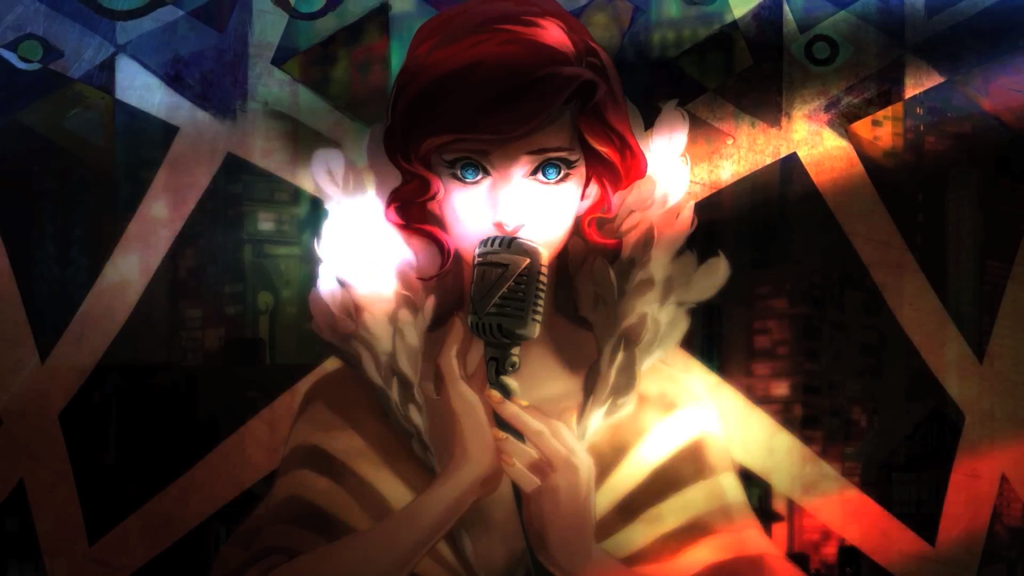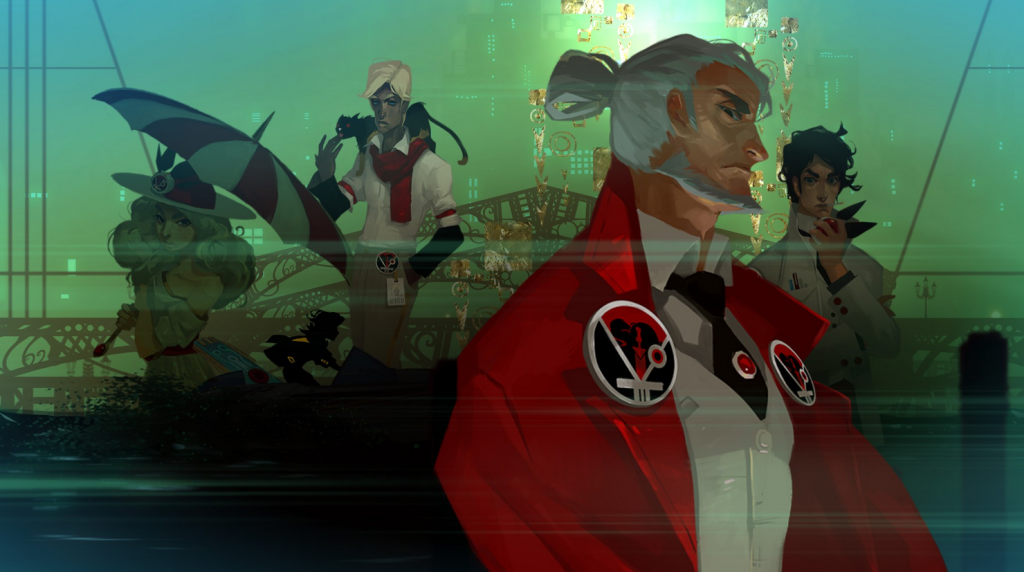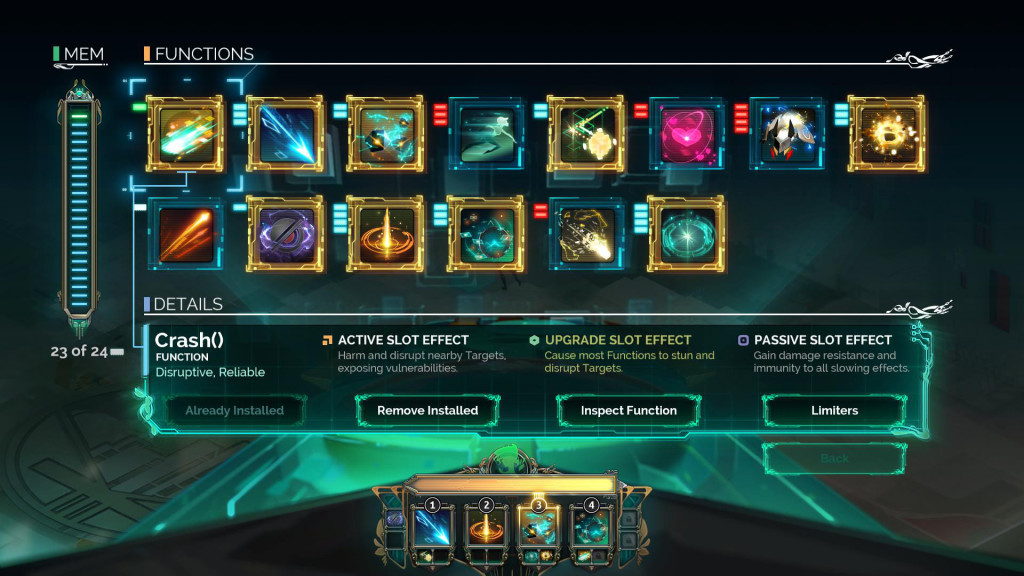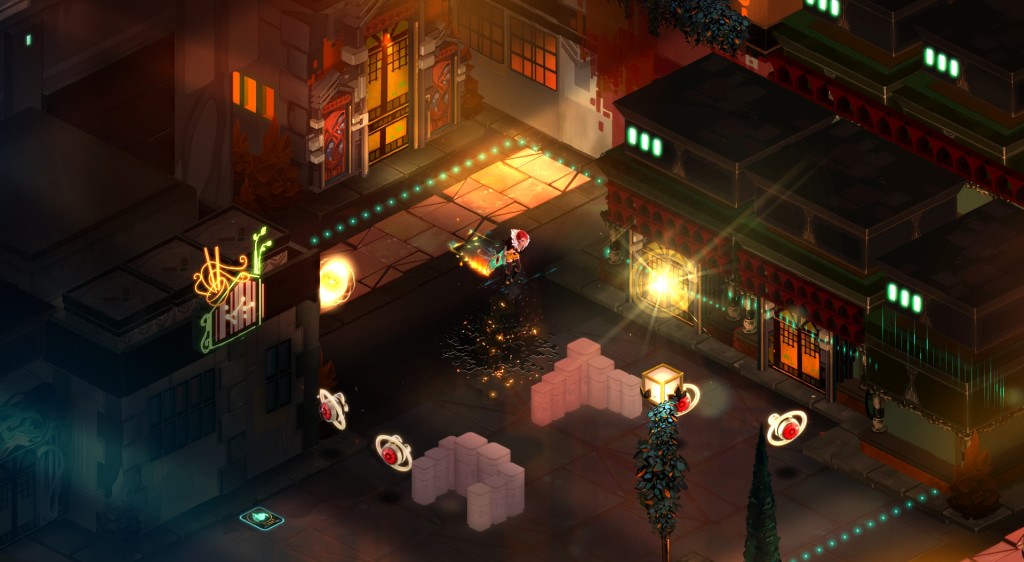Transistor, at first glance, contains a lot of interesting ideas and concepts. Unfortunately, those same ideas do require a sense of planning and structure; Transistor often uses them in a surface-level sense, while failing to integrate its systems and aesthetic holistically. This leads to fundamental disconnects in two different way: a great sense of style without a narrative (or, at least, a very poorly told narrative) and a combat system without focus (more like throwing darts at a wall). In effect, Transistor’s a lukewarm game, much like Bastion also attempted to please everyone by throwing darts everywhere at the wall and missing the bulls eye – kinda like the church at Laodicea.
15 ‘I know your deeds, that you are neither cold nor hot; I wish that you were cold or hot. 16 So because you are lukewarm, and neither hot nor cold, I will[l]spit you out of My mouth.
Revelation 3
To talk about Transistor, we can’t ignore the absolutely gorgeous art design. Clearly inspired by a sort of steam punk Blade Runner, its use of muted earth tones contrasts with that of the “villains”, the Process, who want to wipe the slate clean with their sterile white death. Everything looks marvelous and feels marvelous; it’s a credit to Darren Korb that his soundtrack inclinations remain quite keen. I especially like the use of the “humming” during combat sequences, which take the main musical theme currently playing and strip it down to its barest essentials. Considering how poorly jazz and electronica can mix, Transistor’s soundtrack delights throughout. So far, so good, in the vein of Bastion‘s equally interesting style.
Unfortunately, that appearance masks a greater flaw. For whatever reason, Transistor shuffles towards more of a science-fiction mystery narrative, leading to a completely confusing in media res story. Obviously, Supergiant Games wants to expand its horizons beyond Logan Cunningham exposition every few feet. This time, Cunningham resides in a sword…which might be the dead boyfriend of your main character, Red? Obviously, Greg Kasavin attempts to communicate the narrative and various world-building components through a variety of different means, including text terminals (ugh) and visuals, but it never becomes clear what’s happening, exactly. With Bastion, the story seemed simple enough, mostly since the narration told a story that already happened in some respect; here, you need to look very, very deep to figure out what’s happening beyond the bare essentials. Maybe they want people to play the game more than once; I think I had my fill, thank you very much.
If the story did not seem important, then this wouldn’t present a problem, but Transistor wants to say something about…something. Just, I’m not quite sure why I should care. Transistor somehow avoids the techniques of subtle world-building that games like Dark Souls did so effectively. In Dark Souls, you often acquired items which would hold their own little descriptions; sometimes, these descriptions unlocked pieces of a puzzle in your mind, since you often wondered why you were killing monster X, or why area Y ended up a horrible mess. As you entered the inventory to prepare for future conflicts, you would arrive at this text by sheer happenstance, and a light bulb in your mind would suddenly flash on.
Transistor has none of this. To figure out what happened, you must enter into text terminals during the various save points and examine your Functions, because each of them was a real person. If you like reading text in an action video game, then I suppose it works, but it entirely breaks the flow of the game on so many levels. Furthermore, the lack of motivation to read said terminals (they don’t really encourage you to read them in any way) turns them into purely ancillary diversions, with little in the way of game integration or effects. Without any basic kind of world-building, even enough to create intrigue, it falls apart pretty fast. Heck, at the end, I barely could muster any enthusiasm as to happy, or sad, or whatever feelings: just indifference. Perhaps the relationship between Red and the Transistor remains enough for some people; the text, and rewriting of text, remains a clever device. But honestly, we’ve seen that sort of relationship in some other pop culture media somewhere, haven’t we? In sum, Transistor gets away with using Final Fantasy XIII’s in-game Wikipedia for some reason because it’s stylish.
Thankfully, that dead weight does not get in the way of Transistor’s interesting combat system, a mixture of real-time and turn-based combat (like, for real). First, you set up your ability loadout. Transistor presents a variety of customization to a basic set of abilities, all of which work wonderfully together. Then you kill robots, called the Process, using those abilities. Functions, unlike Bastion‘s weapon loadout, are forced upon you; at some point, you will use all of them as either a primary Function, or secondary, or just a passive bonus (it’s a waste otherwise). Unfortunately, it just feels like a bunch of options for the sake of options at a point – more like personal preference. You have standard projectiles, standard melee attacks, and tons of statistical augmentations to those abilities. The most effective set up I found involved using the Function which gives you Kill(), which turns most battles into an RNG cakewalk. Combos often win the day, as does good positioning after said combo.
Doing those combinations effectively provides the majority of the challenges in Transistor. Basically, the fights take place in preset arenas with a variety of enemies; you don’t often want to use your abilities outright, since they are very slow. Rather, you want to use the system called (lots of confusing names in here) turn(). Pause mode (as I will heretofore call it, because writing mathematical formulas ain’t my jam) transforms what appears to be an action game into a strategy RPG (temporarily). You can see how far you can walk, set up attacks, and generally find out the optimal way to move and use your abilities to do as much damage as possible (or just do effective things like mind control enemies or stun them so you can run away afterwards).
Problems in optimization exist, though; finding out what counts and doesn’t count as a backstab (extra damage bonus if you hit things from behind, but how do you tell what’s the back of an orb thing) is frustrating, to say the least. The isometric perspective, like in Bastion, allows for wonderful visuals but less-than-optimal aiming controls and depth perception. I often found myself running into things because I couldn’t tell the difference between a border, an escape, and God knows what else. The same problem existed in Bastion, and remains a problem here; that said, the Pause mode simply lets you see in advance your borders of possible movement, so that alleviates the problem somewhat. For a game that wants you to be strategic, it has a strange way of not showing you the entire battlefield in advance, even when using Pause mode; the interface can get in the way.
That immediately becomes irrelevant once outside of the Pause mode, which needs to recharge after use. Each ability uses a set amount of the bar, and using the whole thing means that regeneration takes quite a while. As such, combat outside of the pause mode ends up being a stupid dance of running around obstacles and being unable to do anything for protracted periods of time. Dodging stuff involves hiding behind walls and kiting things while you wait for a bar to fill up so you can do useful things again. Pressing combat buttons outside of that mode is a good way to get killed, given that everything has a super long animation and cooldown, even Jaunt. That is super boring and I hate it. I guess you’re supposed to be examining where you will be when pause phase ends, so you can run away/put walls between you and enemies/bosses, but there’s nothing interesting or interactive about this phase. You simply Jaunt (Transistor’s only evasion move) away. Supposedly this means you planned poorly, but I never got a good sense of how long Pause mode actually took to recharge; that inconsistency meant taking a lot of hits. At least in Bastion, they gave me a dodge button, and its pure action-game focus performed well enough; Transistor masquerades as an action game, and really only cares about the strategy part…but not enough strategy to be a strategy game.
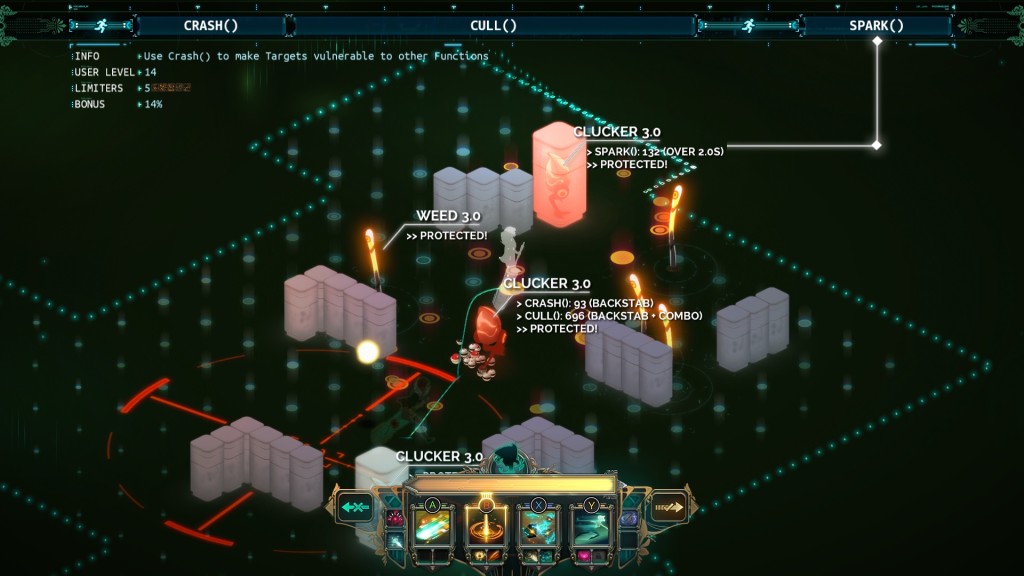
So, the fun part only happens occasionally, and the rest of the time you’re waiting for a giant bar on the top of your screen to refill. Transistor, in that sense, contains hodge-podge of strategy RPG elements grafted on a real-time game that isn’t really a real-time game. It’s confusing, to say the least, how this halfway house of ideas actually came into being. It is as if someone wanted to create an action RPG, but then also wanted a strategy RPG, and then jammed them both together. Neither side of the equation (har har) seems to function (HAR HAR) quite right. I do like that they take away one core function when you die, which actually punishes you for failure…but not really for long! It’s more like compensation for infinite lives instead, since you immediately return with full health. As such, one death is often enough to get you back in the game and invalidating the challenge. Once you obtain enough Functions, just ride the wave and brute force your way through the encounters; the game simply does not care about your performance.
Think of it like this: because Supergiant knows that the average player will die during some battles, they balance almost every battle according to that dictate. As such, since you can almost never die, the battles end up balanced around the use of a few abilities at most. If you permanently died when your health ran out, the developers could balance most fights based around the entire host of abilities at your disposal. This, I think, would improve the game balance substantially; players would need to wrack their brains to figure out the optimal composition for each fight, and all the Functions would end up as useful at some junctures. As it is, they are merely toys, not essential traits. That sort of kitchen-sink design hurts Transistor more often than not.
The problem I have with Supergiant Games never derives from their inspirations. Clearly, the people at Supergiant love and enjoy a variety of games, and often seek to integrate them together. In Transistor, the mixture of real-time and turn-based combat remains fascinating in concept, but somewhat limp in its execution. They want to throw a techno-dytopian science fiction story into a mysterious noir narrative, but for anyone but the most curious you’ll barely find time to figure out what’s happening. The concepts overtake the actual game, and idealism turns to realism the moment hand goes to gamepad. It’s unfortunate, because I think there’s real potential in their games – they just lack that something which should make them amazing.
Note: On Limiters, I find that their appeal rests with whether you like the rest of the game. They make it harder, sure, but then they give you more experience. It completely ruins the balancing of the main game, hence my tendency to avoid them entirely. This happens in most RPGs, so I don’t do them for fear that I will turn the game into easy street. As such, I don’t care if they make the game more difficult or not, since the incentive for more experience points just makes the game easier at the player’s whims.

